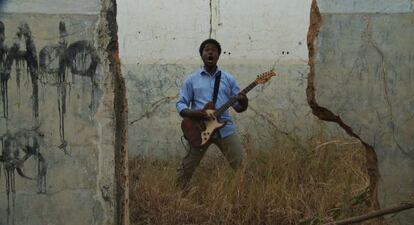A continent gets its drift
Africa's new wave of filmmakers is finding an increasingly powerful voice

Majhoul is now an old man. In 1981 he was arrested for going out onto the street during the bread riot, which called for profound change in Morocco. Now, 30 years later, he is out of jail and having to face a new reality marked by the jolt of the Arab Spring. That is the set-up for the Moroccan film C'est eux les chiens... (or, They are the dogs...), directed by Hicham Lasri and winner of the prize for Best Feature at the 10th edition of the African Film Festival of Cordóba (FCAT).
It was not an easy decision. According to the head of the festival jury, the critic Olivier Barlet, the films presented this year were "innovative and surprising," confirming the strength and diversity of African cinema. It's a phenomenon that has been growing and growing over the last decade; the weakness of production and distribution structures has not prevented the continent from continuing to show its talent.
Despite budget problems, this year's festival brought together an interesting sample of African film with 70 movies from 32 countries. The creative boom in the Maghreb, currently in the middle of political and social upheaval, had a particularly marked presence at the event. Algeria, for instance, was represented by nine films, but there were also productions from Morocco, Tunisia and Egypt.
"In the last decade several filmmakers have burst on to the scene, led by Abderrahmane Sissako [the Malian director of 2007's acclaimed Bamako] and Mahamat Saleh Haroun [from Chad], that have placed Africa in the world. [...] It is a new thought pattern - the new African filmmakers are citizens of the world and share the same esthetic standards as other filmmakers," says Barlet. "Talent is not lacking, but there is a blindness in Europe. What Africa brings to the world is still not recognized."
Which is why, as distribution channels continue to ignore the continent's filmmakers, festivals such as this one have to go on existing, as a kind of positive discrimination.
Where in the early days of African cinema, directors such as Senegal's Ousmane Sembène aimed to educate - following in the wake of the first years of independence - now it is about films "without inhibitions, but at the same time without clear-cut heroes, without solutions for the problems of daily life," Barlet explains.
It is a cinema more marked by uncertainty, both in the background and in that structure. "That is its big stand-out point, the championing of the unpredictable," he adds.
Despite their lack of resources and problems with distribution, African filmmakers tell stories that are worth the effort of listening to. You just need to pay attention. And to remember, says Barlet, that beyond the labels and their origins, they are films, just like any others.
Confirming this are the other stories prized at FCAT, such as the winner of the Best Documentary Feature, Mati Diop's Mille soleils from Senegal, and Les jours d'avant, by Algerian director Karim Moussaoui, which won the award for Best Short Film. The audience award went to Malagasy Mankany, directed by Haminiaina Ratovoarivony, which was entirely shot in Madagascar. "With a budget of $12,500 [9,266 euros] and thanks to a crowdfunding campaign, I was able to make a road movie that shows the dreams and hopes of young people in my country," says its director.
Tu suscripción se está usando en otro dispositivo
¿Quieres añadir otro usuario a tu suscripción?
Si continúas leyendo en este dispositivo, no se podrá leer en el otro.
FlechaTu suscripción se está usando en otro dispositivo y solo puedes acceder a EL PAÍS desde un dispositivo a la vez.
Si quieres compartir tu cuenta, cambia tu suscripción a la modalidad Premium, así podrás añadir otro usuario. Cada uno accederá con su propia cuenta de email, lo que os permitirá personalizar vuestra experiencia en EL PAÍS.
¿Tienes una suscripción de empresa? Accede aquí para contratar más cuentas.
En el caso de no saber quién está usando tu cuenta, te recomendamos cambiar tu contraseña aquí.
Si decides continuar compartiendo tu cuenta, este mensaje se mostrará en tu dispositivo y en el de la otra persona que está usando tu cuenta de forma indefinida, afectando a tu experiencia de lectura. Puedes consultar aquí los términos y condiciones de la suscripción digital.









































